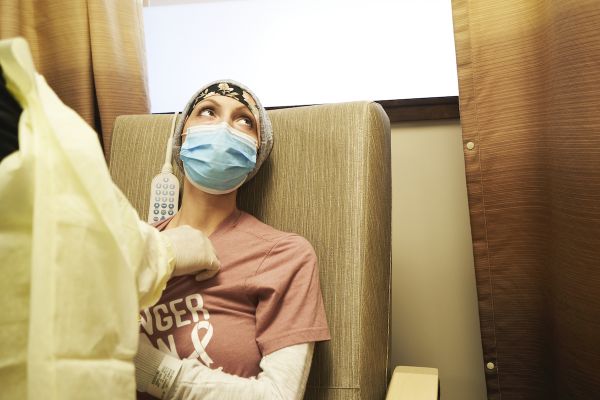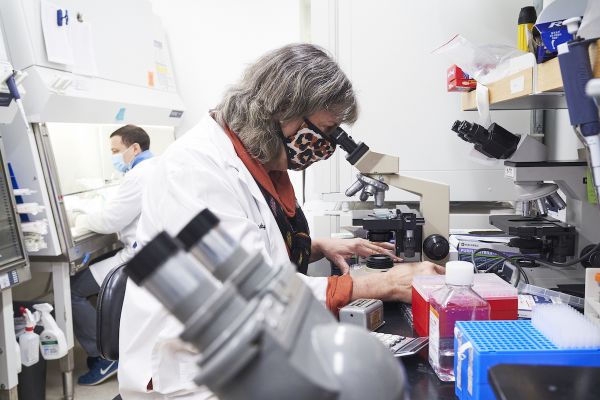Research Interests:
- Stress and Tumor Immunity
- Thermal Stress
- Immunotherapy
- Tumor Microenvironment and Physiology
Biography
Dr. Elizabeth Repasky is a Distinguished Member and Professor of Oncology. She is a Program Leader for the Cancer Stress Biology Program within the Comprehensive Cancer Center. Originally from Western Pennsylvania, Dr. Repasky graduated from Seton Hill University with a BA in Biology, earned her PhD in Anatomical Sciences and Cell Biology from SUNY Buffalo, and completed a postdoctoral fellowship in Cell Biology at the California Institute of Technology.
Dr. Repasky’s laboratory research program is translational and focuses on the mechanisms by which stress promotes cancer progression and therapeutic resistance with the goal of developing novel strategies to improve cancer outcomes. She has had a longstanding interest in the role of thermoregulation and thermal stress and over the last decade, projects in her lab have increased understanding of how chronic stress modulates the physiological, immunological, and biophysical aspects of the tumor microenvironment. A series of projects clarified ways in which stress directly increases tumor cell resistance to therapies and drives suppression of the anti-tumor immune response (Kokolus et al., PNAS 2013; Eng et al., Nature Comm., 2015; Bucsek et al., Cancer Research, 2017; Mohammadpour et al., J. Clin. Invest., 2019; Chen et al., Nature Comm., 2020; Qiao et al, Cancer Immunol Res., 2021; Ghandi et al., Clin Cancer Res., 2021; Mohammadpour et al., Cell Rep., 2021). Together, these studies indicate a role for the sympathetic stress response and adrenergic signaling and have provided the rationale for repurposing drugs used to block signaling through adrenergic receptors (primarily β-blockers) in the treatment of cancer patients. This approach is being tested in ongoing clinical trials in combination with checkpoint inhibitor immunotherapy. Dr Repasky has assembled a transdisciplinary team to expand to better understand the role of nerves in cancer progression and to continue to develop novel approaches to overcoming the detrimental effects of both physical and psychological stress on patient outcomes.
During her career, Dr. Repasky has been committed to mentorship and teaching. She has received several mentoring awards including the Faculty Mentor Award for the Roswell Park Graduate Program, the Roswell Park Graduate Student Association Award for Faculty Excellence in Mentoring and Teaching, the “I am Roswell” Award for “The most inspiring mentor” in the Graduate Program, and the William C. Dewey Award for Mentorship and Training from the Society of Thermal Medicine (2020). She has served as Director of Graduate Studies for the Immunology program and obtained the first NIH T32 tumor immunology grant (which has now been in place 20 years). She has mentored more than 12 postdoctoral fellows, 25 PhD students (including four MD/PhD students) and 30 Masters’ students.
Positions
Roswell Park Comprehensive Cancer Center
- Professor of Oncology
- Distinguished Member
- Co-Leader, Cancer Stress Biology Program
- Department of Immunology
- The Dr. Lawrence J. Minet Endowed Chair in Immunology
Background
Education and Training
- PhD - Anatomy, State University of New York at Buffalo, Buffalo, NY
Fellowship
- 1982 - Cell Biology - California Institute of Technology, Pasadena, CA
Professional Memberships
- American Association of Immunologists
- American Association for Cancer Research
- Cell Stress Society International
- Society for Immunotherapy of Cancer
- Society of Thermal Medicine
- Radiation Research Society
Honors & Awards
- 2019 - Distinguished Biomedical Alumnus, Jacobs School of Medicine and Biomedical Sciences, University at Buffalo
- 2018 - Roswell Park Comprehensive Cancer Center, Department of Educational Affairs, Graduate Student Association Award for Faculty Excellence in Mentoring and Teaching
- 2018 - Recipient of the “Roswell Pride in Member Ingenuity” Award (RPMI)
- 2018 - William C. Dewey Award for “Mentorship and Training of New Investigators” (Society for Thermal Medicine)
- 2015 - Appointed to RPCI Mentorship Committee, to define new strategies to improve mentorship
- 2013 - J. Eugene Robinson Award for “ Outstanding Research in Thermal Medicine” (Society for Thermal Medicine)
- 2011 - RPCI Faculty Award for “Excellence in Mentoring”
- 2007 - Appointed Program Leader: Cell Stress and Biophysical Therapies; Cancer Center 2018
- 2004 - Named the William Huebsch Professor of Immunology
- 2003 - “I am Roswell” Award for Most Inspired and Inspiring Mentor
- 2002 - RPCI “Outstanding Mentor Award” for Scientific Training of Clinical Fellows
- 1996 - Tomasi B. Tomasi Award for Research Excellence, Roswell Park Comprehensive Cancer Center
- 1996 - Distinguished Alumna Leadership Award, Seton Hill University
Research Overview
Featured on CancerTalk
Publications
Recent research papers:
Chen M, Qiao G, Hylander BL, Mohammadpour H, Wang XY, Subjeck JR, Singh AK, Repasky EA. Adrenergic stress constrains development of anti-tumor immunity and abscopal responses following local radiation. Nat Commun. 2020, Apr 14;11(1):1821PMID: 32286326, PMCID: PMC7156731
Mohammadpour H, Sarow JL, MacDonald CR, Chen GL, Qiu J, Sharma, UC, Cao X, Herr MM, Hahn TE, Blazar BR, Repasky EA, McCarthy PL. β2-Adrenergic receptor activation on donor cells ameliorates acute GvHD, JCI Insight 2020 Jun 18;5(12):e137788. PMID:32437333, PMCID: PMC7406296
Gandhi S, Pandey MR, Attwood K, Ji W, Witkiewicz AK, Knudsen ES, Allen C, Tario JD, Wallace PK, Cedeno CD, Levis M, Stack S, Funchain P , Drabick JJ, Bucsek MJ, Puzanov I, Mohammadpour H, Repasky EA, Ernstoff MS. Phase I clinical trial of combination propranolol and pembrolizumab in locally advanced and metastatic melanoma: Safety, Tolerability, and Preliminary Evidence of Antitumor Activity. Clin Cancer Res 2021, Jan 1;27(1):87-95. PMID: 33127652, PMCID: PMC7785669
Roberts NT, MacDonald CR, Mohammadpour H, Antoch MP, Repasky EA. Circadian Rhythm Disruption Increases Tumor Growth Rate and Accumulation of Myeloid-Derived Suppressor Cells. Adv Biol (Weinh). 2022;6(9):e2200031. Epub 2022/06/03. doi: 10.1002/adbi.202200031. PubMed PMID: 35652494; PMCID: PMC9474681.
Hylander BL, Qiao G, Cortes Gomez E, Singh P, Repasky EA. Housing temperature plays a critical role in determining gut microbiome composition in research mice: Implications for experimental reproducibility. Biochimie. 2023;210:71-81. Epub 2023/01/25. doi: 10.1016/j.biochi.2023.01.016. PubMed PMID: 36693616.
Recent reviews:
MacDonald CR, Choi JE, Hong CC, Repasky EA. Consideration of the importance of measuring thermal discomfort in biomedical research. Trends in molecular medicine. 2023;29(8):589-98. Epub 2023/06/18. doi: 10.1016/j.molmed.2023.05.010. PubMed PMID: 37330365.
James CM, Olejniczak SH, Repasky EA. How murine models of human disease and immunity are influenced by housing temperature and mild thermal stress. Temperature (Austin, Tex). 2023;10(2):166-78. Epub 2023/06/19. doi: 10.1080/23328940.2022.2093561. PubMed PMID: 37332306; PMCID: PMC10274546.
Hylander BL, Repasky EA, Sexton S. Using Mice to Model Human Disease: Understanding the Roles of Baseline Housing-Induced and Experimentally Imposed Stresses in Animal Welfare and Experimental Reproducibility. Animals : an open access journal from MDPI. 2022;12(3). Epub 2022/02/16. doi: 10.3390/ani12030371. PubMed PMID: 35158694; PMCID: PMC8833596.
Singh AK, Chatterjee U, MacDonald CR, Repasky EA, Halbreich U. Psychosocial stress and immunosuppression in cancer: what can we learn from new research? BJPsych Adv. 2021;27(3):187-97. Epub 2021/07/24. doi: 10.1192/bja.2021.9. PubMed PMID: 34295535; PMCID: PMC8294471.
Chen M, Singh AK, Repasky EA. Highlighting the Potential for Chronic Stress to Minimize Therapeutic Responses to Radiotherapy through Increased Immunosuppression and Radiation Resistance. Cancers. 2020;12(12). Epub 2021/01/10. doi: 10.3390/cancers12123853. PubMed PMID: 33419318; PMCID: PMC7767049.



